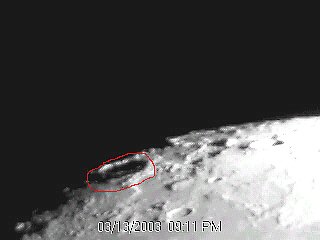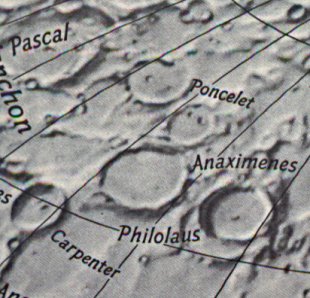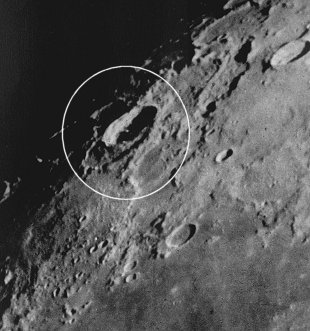Philolaus Lunar Light Ray
Initial Reports
 |
Hi,
I took this image with a Logitech AstroCam and my 8"SCT, f/10. The date and local time are on the image. The colongitude at the time was 39.5.
If you look at the crater you can just see a sliver of light. Please let me know if this is the first time a sunrise ray is seen in this crater. Thank you.
Clear Skies,
Daniel del Valle
Puerto Rico |
The Initial Predictions, Using Data in Original Reporting
The digital image shows the picture being taken on 3/13/2003 at 9:11pm. It is difficult to tell whether this is an actual lunar light ray, or some crater floor detail being illuminated by the sun. I am therefore placing the crater in the database for further follow up. Using the date and time on the digital image, and with Puerto Rico being in the Atlantic Time Zone, which is 4 hours west of Greenwich. The date and time therefore in universal time becomes, 3/14/2003 at 1:11hr UT.
Since no site coordinates were given, the general longitude and latitude of W66.5 and N18.5 will be used in computations.
Site Longitude = +66.500
Site Latitude = +18.500
Feature = PHILOLAUS
Feature Longitude: = -32.400
Feature Latitude: = +72.100
Reproducing Lighting For: 2003/3/14 at 01:11 U.T.
Desired Solar Altitude = +0.800(Rising), Azimuth = +97.220
Average Co-longitude = 35.003
In the Time column, D=Daylight, T=Twilight
---- Moon's ---- -- Earth's --
Topocentric Topocentric -------- Sun's --------
UT Date Time Alt° Semi-Diam'' Long° Lat° Colong° Lat° Azim°
2003/03/14 01:11 +82.090 949.85 -7.573 -5.300 039.518 -1.452 +97.220
Crater Description:
Philolaus, -165,+949: A crater 46 miles in diameter, with terraced walls rising 12,000 feet above a floor upon which are many irregularities, the two highest being south of the center.Near the north-east wall is a ridge, and a craterlet-chain runs along the outer west wall., continuing far north to a ring which contains two prominent craters. There is a large landslip on the west,. At the foot of the inner southeast wall there is a hillock, and there is another on the north-east. It has been reported that the shadow shows a slight brownish cast. Philolaus overlaps an ancient ring on the east. (Wilkins and Moore, The Moon, Faber & Faber Ltd., 1955)


Return to Home or use your browser back button


